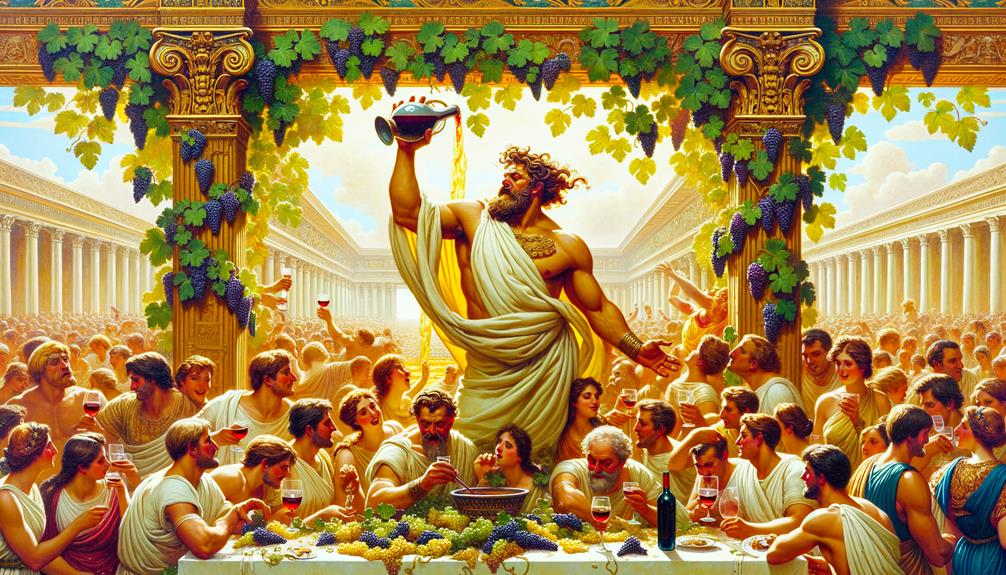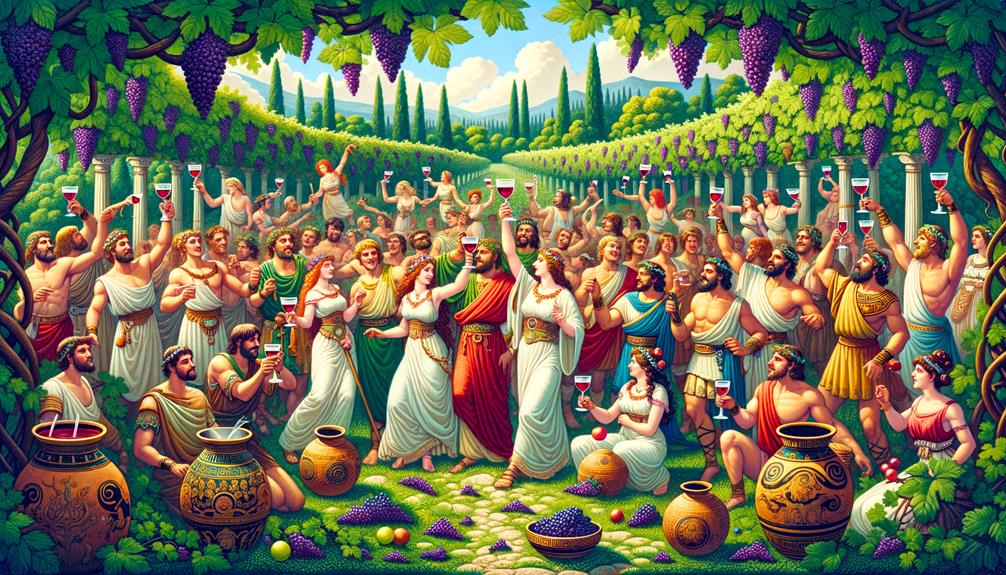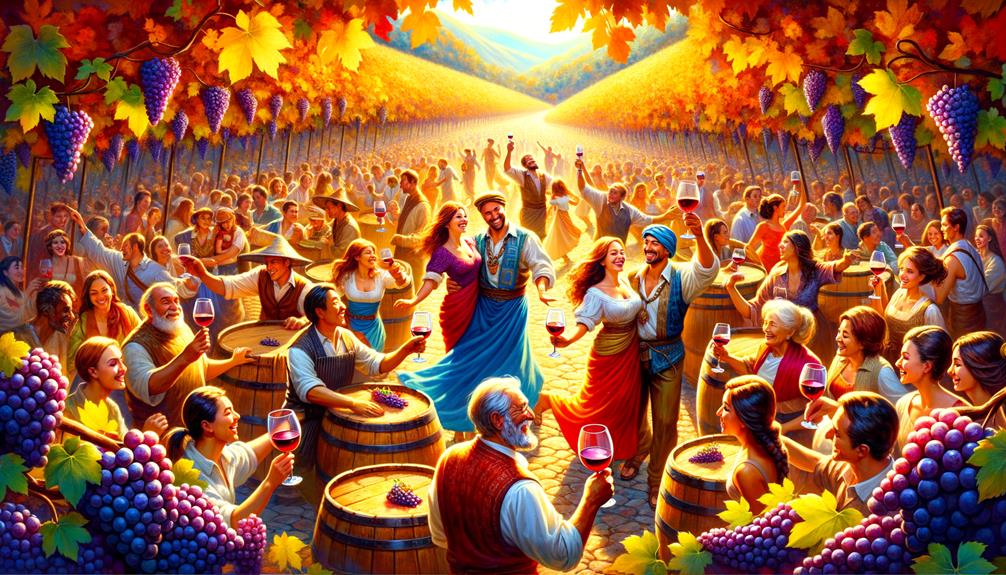The ancient rituals surrounding the god Bacchus reveal an intriguing journey into liberation and indulgence. Transcending the mere celebration of wine, his followers sought a profound connection through ecstatic rites. Fascinating to explore is how these secretive rituals transformed into grand public processions, each symbolic march narrating fertility, revelry, and excess. But what deeper meanings lurk beneath these age-old practices, awaiting revelation?
Origins of Bacchanalia
Peering into Bacchanalia's genesis unravels a saga steeped in archetypal transformation and ecstasy motifs, the Roman festivities deriving their zeal from the earlier, clandestine Greek Dionysia. The Bacchanalia, notorious Roman festivities venerating Bacchus, directly descended from the Greek Dionysia. These celebrations, imported around 200 BC, commenced as private, secretive gatherings where devotees sought a connection with Bacchus through unrestrained revelry and excessive imbibing, embodying the god's promise of liberation and rapture.
Initially shrouded in mystique, these covert gatherings embodied the hero's excursion into the unknown. However, over time, the Bacchanalia metamorphosed into public festivities, attracting more participants and escalating raucousness. This metamorphosis didn't evade the Roman Senate's watchful eye. By 186 BC, the Senate moved to suppress the Bacchanalia, alarmed by the illicit activities accompanying these celebrations. The scandal led to strict legislation and penalties, marking a significant overhaul in Roman religious practices. The Senate's intervention highlighted the tension between individual rapture and societal order, a recurrent theme in myths and human history.
Bacchus in Roman Culture

Bacchus casts a lively spirit over Roman culture as a symbol of indulgence, his influence flowing like the wine he embodies. Also known as Liber Pater, Bacchus wasn't merely the god of wine; he signified fertility and unrestrained revelry. His presence infused Roman mythology, resonating with the common folk who found joy and celebration in his rituals.
In Roman society, Bacchus's impact was profound:
- Fertility: As Liber Pater, Bacchus was revered for his connection to fertility, symbolizing the life-giving properties of wine and nature.
- Festivities: Bacchic celebrations were renowned for their joyous, uninhibited festivities, often involving grand processions that captivated the Roman masses.
- Protector of the Common People: Bacchus held particular significance for the common citizens, embodying their aspirations and daily struggles, offering a divine guardian.
- Royal Symbols: Associated with introducing royal symbols, Bacchus added an aura of divine authority to celebrations honoring him.
Through these facets, Bacchus, or Liber Pater, became an enduring representation of wine, revelry, and the indomitable human spirit within Roman mythology.
Rituals and Traditions

Bacchus, the Roman god of wine, fueled an intoxicating ritual known as Bacchanalia. Participants would sacrifice goats and swine before plunging into an evening of excessive drinking, dancing, and revelry. They threw off societal norms for a night of pure freedom.
The Bacchanalia provided an escape from the ordinary, allowing revelers to explore creative expression through theatrical shows, poetry readings, and artistic displays. The ritual let the wilder side emerge:
| Activities | Purpose |
|---|---|
| Animal Sacrifices | Honor Bacchus |
| Drinking & Dancing | Ecstatic Release |
| Performances | Creative Outlet |
As boundaries dissolved in their Bacchic frenzy, participants found a temporary reprieve from life's constraints. However, Roman authorities grew concerned over the secrecy and scandal surrounding these events, leading to their suppression by the Senate. The festivities highlighted an eternal clash between individual liberty and societal control.
Symbols of Bacchus
Bacchus, the embodiment of transformation and ecstasy, wields symbols like the grapevine, ivy, and thyrsus to illustrate his power over nature and revelry. These elements reveal his archetypal journey as an agent of liberation and joy, guiding mortals through the ecstatic experience of wine and celebration.
Bacchus' symbols aren't mere decorations but underscore his divine influence:
- Grapevines: They represent his dominion over wine and its transformative power. They symbolize growth, harvest, fermentation – mirroring the journey from mundane to divine.
- Ivy: Crowning Bacchus, ivy symbolizes eternal life and fidelity. Its evergreen nature ties it to the perpetual cycle of seasons and the undying spirit of revelry.
- Thyrsus: This pine cone-topped staff is a potent symbol of pleasure, fertility, and transformation. It reflects Bacchus' role in rituals where ecstasy and liberation reign supreme.
- Wine Cup: This vessel represents the liquid essence of Bacchus' power – a symbol of communal revelry and liberation found in shared celebration.
Through these primal symbols, Bacchus encapsulates nature's forces and the ecstatic human potential, inviting us to partake in the timeless dance of liberation and joy.
Modern Interpretations

In our modern world, Bacchus transcends ancient myth to symbolize liberation and the joy of celebrating life's pleasures. Today, interpretations heavily associate him with revelry, partying, and indulging in life's delights. This wine god seamlessly adapts to grace contemporary media, music, and pop culture as the ultimate icon of festivity and indulgence.
However, this transformation sometimes overshadows his deeper ties to agriculture and rural living. Historically revered for wine and fertility, his influence on nature's cycles and rural prosperity ran deep. Though less emphasized now, this agricultural legacy remains integral to his mythological tapestry.
In the popular imagination, Bacchus embodies timeless freedom and release from the mundane to experience euphoria. Artistic depictions continue drawing from these powerful themes, reminding us how Bacchus, the wine god, brings joy transcending time and culture.
Frequently Asked Questions
Are Liber and Bacchus the Same?
Originally separate deities, Liber and Bacchus gradually coalesced into a unified symbol of wine and revelry. Their convergence reflects deeper cultural shifts and society's evolving relationship with intoxicants.
At first, Liber represented wine and fertility among ancient Roman communities. Meanwhile, Bacchus, the Greek Dionysus, embodied ritual madness and ecstatic release. As cultures intermingled, their distinctions blurred.
Over time, these god archetypes fused into an icon celebrating life's pleasures and uninhibited celebration. The transition underscores a collective longing to transcend daily restraints through drink and dance. Today's modern hedonistic festivals like spring break draw parallels to ancient Bacchanalia rites honoring this syncretic divinity.
Who Is Bacchus the God of Wine Drunkenness Madness and Revelry?
Bacchus epitomizes the liberating spirit of wine, drunkenness, madness, and revelry – an archetype inviting us on a transformative, ecstatic journey transcending societal norms. Like uncorking a fine vintage, he unleashes our uninhibited selves, reveling in unrestrained merriment. Embodying hedonistic indulgence, Bacchus encapsulates the allure of temporary abandon and carefree euphoria.
Who Is the God of Wine and Revelry?
Bacchus encapsulates the liberating power of celebration and self-expression. His mythical journey represents how letting loose and embracing revelry can dissolve personal boundaries, unlocking profound insights. As the god of wine and merrymaking, Bacchus symbolizes transformative ecstasy through unrestrained joy and creativity.
What Are the Rituals of Bacchus?
The rituals of Bacchus involved energetic dancing, theatrical performances, and animal sacrifices. Participants pursued an escape from ordinary life, embracing Bacchus' themes of liberation and artistic expression through intoxicating wine.


